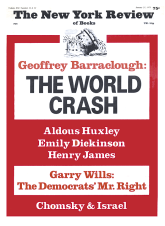In response to:
Making Black Music from the October 17, 1974 issue
To the Editors:
In the firestorm of protest that will probably follow Virgil Thomson’s remarkably wrongheaded essay on “Black Music” [NYR, October 17] someone should amiably point out that, no matter what, it is still possible to admire the composer of Wheatfield at Noon, Four Saints in Three Acts, and the marvelous film scores for The River and The Plow That Broke the Plains. It is even still possible to contend that, historically, he may be America’s most important music critic (though his singularly perverse essay on Ives in your pages tends to damage any claims history might have).
Nevertheless, Mr. Thomson’s disquisition on jazz and black musical culture was deeply embarrassing to read. There should be hell to pay. How else can you make up for the following: 1) Mr. Thomson’s quote from Ross Russell’s Bird Lives followed by the declaration that the quote tells “mostly all” that is significant about Charlie Parker “except that the tenor sax was his instrument and that before his early death in 1955, he had planned to study formal composition with Stefan Wolpe and Edgard Varese.” Surely in the 404 pp. of Russell’s book (and the 1214 other pages Mr. Thomson reviewed), he must have learned that Charlie Parker’s main instrument was the alto saxophone. He frequently played (and was recorded on) tenor but if the alto saxophone was ever anyone’s instrument, it was Charlie Parker’s.
2) Mr. Thomson’s contention that A. E. Spellman’s Black Music: Four Lives “examines the achievements and hard times of pianist Cecil Taylor (classically educated in music), saxophonist (chiefly on soprano) Ornette Coleman….” Mr. Spellman, or anyone else with a rudimentary grasp of the facts, would examine Coleman’s achievements—again as with Parker—on the alto saxophone. Perhaps Mr. Thomson is confused by the fact that when Ornette Coleman first came to jazz prominence, he played on a plastic instrument. Perhaps, he confuses Coleman with John Coltrane who played soprano as well as tenor saxophone and was, in fact, the primary cause of the instrument’s present popularity in jazz. Whatever the reason, Mr. Thomson does seem to get his saxophones mixed up. Aren’t these facts a bit basic to be treated so cavalierly in an intelligent discussion (and if it is not meant to be an intelligent discussion, couldn’t he give us more clues to his frivolous intentions)?
3) Mr. Thomson’s speculation “as if inside all US blacks there were, and just maybe there is, some ancient and African enzyme, voracious for digesting whatever it encounters in the way of sound.” Giving Mr. Thomson the benefit of every doubt, one would charge that up to metaphorical exuberance rather than genteel racism. Still, it’s a bit sticky isn’t it?
4) Mr. Thomson’s generous permission for black Americans to “save us if they can.”
“Their best chance is through music,” says Mr. Thomson. “Besides should God himself turn out to be a Negro mammy (‘She’s black’ they do say), nobody would feel more secure than this unreconstructed Confederate. But the trouble is that in spite of TV and radio, possibly because of them, most whites hate music; too few have any ear for it at all.” Doesn’t he knew when lighthearted horsing around becomes grotesque?
5) Mr. Thomson’s flat-out declaration that “the politically radical movements of the 1960s among white college students were not nourished on rock but on the very best avant-garde jazz. Ben Sidran has information about that.” Mr. Sidran may have all the information in the world but the Weathermen clearly didn’t get their name from the music of Cecil Taylor, John Coltrane or Ornette Coleman. A young folk-rocker from Hibbing, Minnesota can take a bow for that if he wants to. At campus rallies, one did not hear militance spurred on by Ornette Coleman on student union PA systems. But the Rolling Stones were everywhere—“Street Fighting Man” specifically.
There are, of course, more such absurdities but I’m sure your letters column will not lack contributors to point them out.
I suppose Virgil Thomson is due some credit for writing about the subject at all. If only his essay had encouraged the kind of controversy which cliché terms “healthy.” If only his essay weren’t so damned sad.
Jeff Simon
Buffalo Evenings News
Buffalo, New York
Virgil Thomson replies:
The slip of tenor for Charlie Parker’s alto sax (not caught by me or the office, but by many correspondents) is admitted.
The soprano sax for Ornette Coleman is correct for his early career. When he first played in New York at the Five Spot that’s what I thought he was playing, a pink plastic soprano. That is also when I first knew and heard him. Ditto for Leonard Bernstein and many other New York long-hairs. I am aware that he also later played alto. Actually we had some correspondence and I had the honor of recommending him (successfully, I think) for a Guggenheim fellowship.
Both correspondents seem not to have read the books regarding which they deplore my comments.
Ben Sidran’s information about the addiction of politically radical white college students to black music, which Jeff Simon seems to doubt, can be found in Black Talk (paperback) on page 174.
This Issue
January 23, 1975



